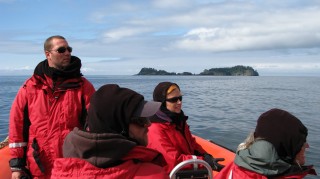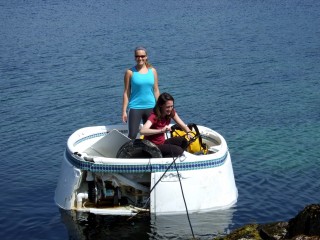Protecting the “Jewel of the Tongass”
By Kelsey Skaggs
I’m Kelsey Skaggs, ACF’s intern at the Sitka Conservation Society. I grew up in Juneau and have spent a lot of time in the Southeast Alaskan wilderness. This June, I graduated from the University of California at Davis, and flew to Sitka to start my internship the next day. At the Sitka Conservation Society, I am gathering information about the role of Kruzof Island in the lives of Sitkans.
Our goal is to have Kruzof Island designated a National Monument, which would preserve the island for the wide variety of uses to which it is currently put and ensure that it remains protected in the long term. Kruzof is an important place for personal recreation; it has two Forest Service cabins, accessible trails, mooring buoys, and many places to camp. Local businesses take visitors to Kruzof for wildlife viewing, hunting, snorkeling, surfing, ATV tours, and more. The island is of great cultural importance for the Tlingit people and for all residents of Sitka. Geologically and ecologically it is unique, home to the Mount Edgecumbe volcano field and to brown bears, Sitka black-tailed deer, and other wildlife. My work will give Sitka Conservation Society a clear picture of the activities that take place on Kruzof and the people who depend on the island.

In addition to gathering information, I am telling the story of Kruzof Island through multimedia projects. I am collecting stories of people who depend on or visit Kruzof and making them accessible through new media. Having the perspectives of a variety of users collected in one place will allow the Sitka Conservation Society – or any reader of my blog – to understand the many roles and meanings of Kruzof Island. From this understanding, we can build those powerful and essential coalitions that will be the future of Alaska conservation.
Alaska conservation is important to me as someone who grew up in the Tongass. I spent a lot of time on Yakobi Island, worked on a fishing scow near Pelican, and fished on my family’s boat. The Southeast Alaskan wilderness is an integral part of who I am, and my commitment to conservation work is very personal. Living in the lower forty-eight to attend school has made me appreciate the uniqueness of Alaska even more. It is more than just land: Alaskans possess a sense of place that most people crave but will never experience.
I also value Alaska conservation for the larger significance of our wilderness. For example, we know that the Tongass is an amazing ecosystem and home to many different species, and that it is one of the most important forests in the world in terms of storing carbon. This means that in addition to its physical and cultural significance for Alaskans and visitors, our wilderness has a vital global role. In these terms, Alaska conservation should be important to everyone.
I believe that conservation is one issue on which it is possible to build broad consensus, and that few are immune to the power of this place. Most people who establish a relationship with the land, whether they rely on it for jobs, spiritual renewal, recreation, or are simply visitors, feel that it is important and should be preserved. I value Alaska conservation for what I see as its potential to bring people together – with a place and with each other.

A typical day at work means that I am in the field, studying the ways that Kruzof is used for recreation, research and business. However, there is the occasional unplanned event. A few days after arriving in Alaska, I was surprised to find myself floating along Sitka Sound in a hot tub. The hot tub in question had floated onto an otherwise pristine beach on the Apple Islands, a popular place for boating and camping, where it sat leaking contaminants. I organized a cleanup trip in partnership with Coastal Footprint, a non-profit organization involved in beach cleanup. Along with several other Sitka Conservation Society interns, we set off to remove the hot tub from the beach. We planned to demolish the hot tub on-site and transport the pieces back to town where they could be disposed of properly. However, cutting up the hot tub with a chainsaw would have made a mess of tiny particles, so we attempted to wrestle it off the beach. This approach to hot tub removal proved successful, and we got the hot tub into the ocean and towed it back to town – with two interns riding inside. This episode resulted in a new slogan for Sitka Conservation Society interns: “Saving the world – one hot tub at a time.”


